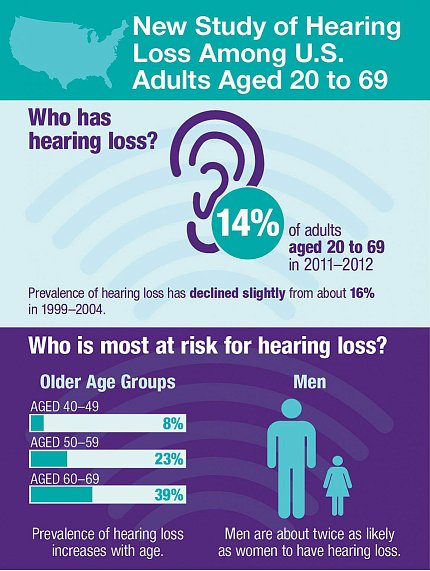Hearing Loss Prevalence Declining in U.S. Adults Ages 20-69

Hearing loss among U.S. adults ages 20 to 69 has declined over the last decade, even as the number of older Americans continues to grow. These findings, published Dec. 15 in JAMA Otolaryngology–Head & Neck Surgery, also confirm that hearing loss is strongly associated with age and other demographic factors such as sex, race/ethnicity and education. Noise exposure, which is potentially preventable, was also significant but less strongly associated after adjustment for other factors. The research was supported by NIDCD and the National Institute for Occupational Safety and Health.
The researchers found that the overall annual prevalence of hearing loss dropped slightly, from 16 percent to 14 percent, or 28 million adults, in the 1999–2004 period versus 27.7 million in the 2011–2012 period. This decline in absolute numbers was observed despite an increase in the population generally and in the relative number of adults ages 50 to 69 in the more recent time period. The new results are consistent with previous findings showing improvements in hearing over time, when researchers compared NHANES data from 1999 to 2004 with data from 1959 to 1962.
“Our findings show a promising trend of better hearing among adults that spans more than half a century,” said Howard Hoffman of NIDCD’s Epidemiology and Statistics Program. “The decline in hearing loss rates among adults under age 70 suggests that age-related hearing loss may be delayed until later in life. This is good news because for those who do develop hearing loss, they will have experienced more quality years of life with better hearing than earlier generations.”
The researchers do not know the reason why hearing loss prevalence is declining but speculate possible factors could include fewer manufacturing jobs, increased use of hearing protectors, less smoking and advances in health including better medical care to manage risk factors associated with hearing loss.
